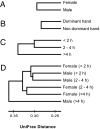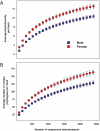The influence of sex, handedness, and washing on the diversity of hand surface bacteria
- PMID: 19004758
- PMCID: PMC2584711
- DOI: 10.1073/pnas.0807920105
The influence of sex, handedness, and washing on the diversity of hand surface bacteria
Abstract
Bacteria thrive on and within the human body. One of the largest human-associated microbial habitats is the skin surface, which harbors large numbers of bacteria that can have important effects on health. We examined the palmar surfaces of the dominant and nondominant hands of 51 healthy young adult volunteers to characterize bacterial diversity on hands and to assess its variability within and between individuals. We used a novel pyrosequencing-based method that allowed us to survey hand surface bacterial communities at an unprecedented level of detail. The diversity of skin-associated bacterial communities was surprisingly high; a typical hand surface harbored >150 unique species-level bacterial phylotypes, and we identified a total of 4,742 unique phylotypes across all of the hands examined. Although there was a core set of bacterial taxa commonly found on the palm surface, we observed pronounced intra- and interpersonal variation in bacterial community composition: hands from the same individual shared only 17% of their phylotypes, with different individuals sharing only 13%. Women had significantly higher diversity than men, and community composition was significantly affected by handedness, time since last hand washing, and an individual's sex. The variation within and between individuals in microbial ecology illustrated by this study emphasizes the challenges inherent in defining what constitutes a "healthy" bacterial community; addressing these challenges will be critical for the International Human Microbiome Project.
Conflict of interest statement
The authors declare no conflict of interest.
Figures




Similar articles
-
Hand bacterial communities vary across two different human populations.Microbiology (Reading). 2014 Jun;160(Pt 6):1144-1152. doi: 10.1099/mic.0.075390-0. Epub 2014 May 11. Microbiology (Reading). 2014. PMID: 24817404
-
Temporal variability is a personalized feature of the human microbiome.Genome Biol. 2014 Dec 3;15(12):531. doi: 10.1186/s13059-014-0531-y. Genome Biol. 2014. PMID: 25517225 Free PMC article.
-
The method used to dry washed hands affects the number and type of transient and residential bacteria remaining on the skin.J Hosp Infect. 2019 Apr;101(4):408-413. doi: 10.1016/j.jhin.2018.12.005. Epub 2018 Dec 8. J Hosp Infect. 2019. PMID: 30537524
-
Review of human hand microbiome research.J Dermatol Sci. 2015 Oct;80(1):3-12. doi: 10.1016/j.jdermsci.2015.07.006. Epub 2015 Jul 23. J Dermatol Sci. 2015. PMID: 26278471 Review.
-
The Rare Biosphere: This report is based on a colloquium convened by the American Academy of Microbiology on April 27–29, 2009 in San Francisco, CA.Washington (DC): American Society for Microbiology; 2011. Washington (DC): American Society for Microbiology; 2011. PMID: 32809309 Free Books & Documents. Review.
Cited by
-
Co-occurrence patterns of plants and soil bacteria in the high-alpine subnival zone track environmental harshness.Front Microbiol. 2012 Oct 11;3:347. doi: 10.3389/fmicb.2012.00347. eCollection 2012. Front Microbiol. 2012. PMID: 23087675 Free PMC article.
-
Improved detection of bifidobacteria with optimised 16S rRNA-gene based pyrosequencing.PLoS One. 2012;7(3):e32543. doi: 10.1371/journal.pone.0032543. Epub 2012 Mar 28. PLoS One. 2012. PMID: 22470420 Free PMC article.
-
Interactions between host factors and the skin microbiome.Cell Mol Life Sci. 2015 Apr;72(8):1499-515. doi: 10.1007/s00018-014-1812-z. Epub 2014 Dec 30. Cell Mol Life Sci. 2015. PMID: 25548803 Free PMC article. Review.
-
Significant changes in the skin microbiome mediated by the sport of roller derby.PeerJ. 2013 Mar 12;1:e53. doi: 10.7717/peerj.53. Print 2013. PeerJ. 2013. PMID: 23638391 Free PMC article.
-
Wild plant species growing closely connected in a subalpine meadow host distinct root-associated bacterial communities.PeerJ. 2015 Feb 26;3:e804. doi: 10.7717/peerj.804. eCollection 2015. PeerJ. 2015. PMID: 25755932 Free PMC article.
References
Publication types
MeSH terms
Grants and funding
LinkOut - more resources
Full Text Sources
Other Literature Sources

